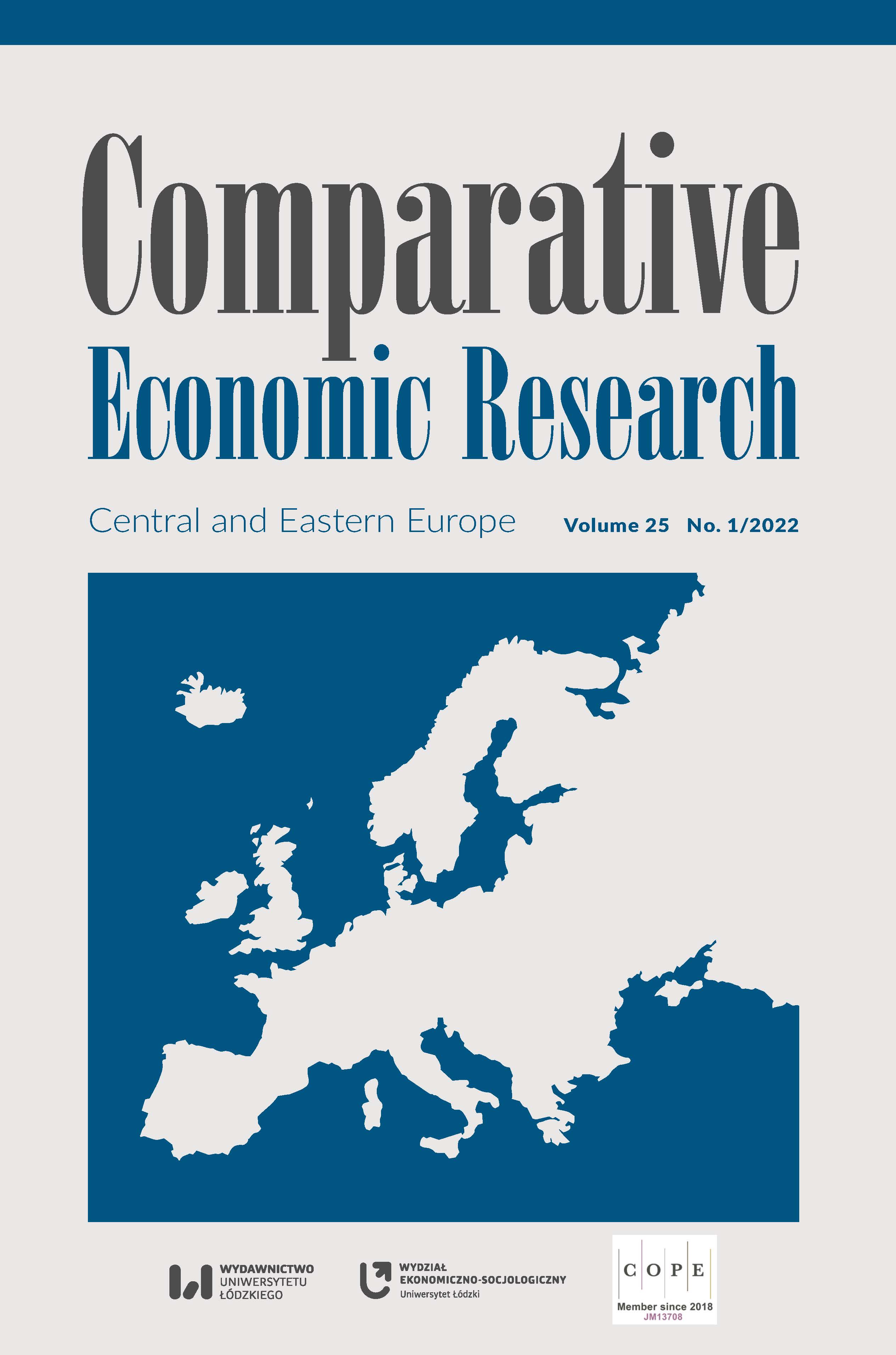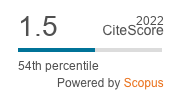Wpływ pandemii COVID–19 na gospodarkę społeczną w krajach europejskich
DOI:
https://doi.org/10.18778/1508-2008.25.07Słowa kluczowe:
modele ekonomii społecznej, ochrona zdrowia, globalne i lokalne czynniki społeczne, pandemia, analiza czynnikowa, ładunek czynnikowyAbstrakt
Od wybuchu pandemii COVID–19 na całym świecie odnotowano 1 miliard zidentyfikowanych przypadków i ponad 2 miliony zgonów. Obecny globalny problem pandemii, wraz z wprowadzeniem niepopularnych środków, takich jak zamknięcie granic i całkowita kwarantanna, ujawnił konflikt istniejący między wzrostem gospodarczym, utrzymaniem zdrowia ludzi oraz nasileniem tradycyjnych problemów globalnych, takich jak głód, ubóstwo i nierówności społeczne. Z negatywnymi skutkami pandemii zderzyły się nawet kraje oparte o model gospodarki społecznej. Celem artykułu jest zbadanie czynników rozwoju modelu gospodarki społecznej (liberalnego, kontynentalnego, skandynawskiego, śródziemnomorskiego i przejściowego) w czasie pandemii. Przedmiotem badań są kraje wykorzystujące model ekonomii społecznej (Białoruś, Słowacja, Irlandia, Szwecja i Polska). Zastosowana metoda badawcza to modelowanie czynnikowe globalnych i krajowych (lokalnych) czynników społecznych, które wywołały różne konsekwencje pandemii w poszczególnych krajach. Kraje o różnych modelach ekonomii społecznej mogą wykorzystać prezentowane wyniki i zalecenia do opracowania polityki społecznej służącej przeciwdziałaniu pandemii.
Pobrania
Bibliografia
Abodunrin, O., Oloye, G., Adesola, B. (2020), Coronavirus pandemic and its implication on global economy, “International Journal of Arts, Languages and Business Studies”, 4, pp. 13–23.
Google Scholar
Bai, J., Du, S., Jin, W., Wan, C. (2020), The Impact of Social Capital on Individual Responses to COVID–19 Pandemic: Evidence from Social Distancing, http://doi.org/10.2139/ssrn.3609001 (accessed: 28. 06. 2020).
Google Scholar
DOI: https://doi.org/10.2139/ssrn.3609001
Baltgailis, J. (2019), The issues of increasing the effectiveness of teaching comparative economics, “Insights into Regional Development”, 1 (3), pp. 190–199, https://doi.org/10.9770/ird.2019.1.3(1)
Google Scholar
DOI: https://doi.org/10.9770/ird.2019.1.3(1)
Barry, A., McGwire, S., Porter, K. (2015), Global AgeWatch Index. Insight report, Help-Age International, London.
Google Scholar
Esping‑Andersen, G. (1990), The Three Worlds of Welfare Capitalism, Princeton University Press, Princeton, https://doi.org/10.1177/095892879100100108
Google Scholar
DOI: https://doi.org/10.1177/095892879100100108
Halasiuk, V. (2020), Great deleveraging. What will happen to the economy after the Coronavirus, https://nv.ua/ukr/biz/experts/globalna‑ekonomika‑pislya‑pandemiji‑koronavirusu‑shcho‑bude‑i‑chim‑vse‑zakinchitsya‑viktor‑galasyuk-50080230.html (accessed: 8. 04. 2020) [in Ukr. ].
Google Scholar
Halushka, Z. I. (2009), Socialization of transformation economy: characteristics, problems and priorities, Chernivtsi National University, Chernivtsi [in Ukr. ].
Google Scholar
Index of Economic Freedom (2019), https://www.heritage.org/index/pdf/2019/book/index_2019.pdf (accessed: 8. 06. 2020).
Google Scholar
Khalafian, А. А. (2007), STATISTICA 6. Statistical data analysis, ООО“Binom‑Press”, Moscow [in Rus. ].
Google Scholar
NEF (2016), The Happy Planet Index 2016, https://static1.squarespace.com/static/5735c421e321402778ee0ce9/t/57e0052d440243730fdf03f3/1474299185121/Briefing+paper+‑+HPI+2016.pdf (accessed: 8. 04. 2020).
Google Scholar
OECD (2019), Average wages, https://data.oecd.org/earnwage/average‑wages.htm#indicator‑chart(accessed: 18. 12. 2019).
Google Scholar
Sapir, A. (2005), Globalization and the Reform of European Social Models (Background document for the presentation at ECOFIN informal Meeting in Manchester, 9 Sept. 2005, https://graspe.eu/SapirPaper.pdf (accessed: 6. 04. 2020).
Google Scholar
Schmitz, H. (1995), Collective efficiency: growth path for small‑scale industry, „Journal of Development Studies”, 31 (4), pр. 529–566, https://doi.org/10.1080/00220389508422377
Google Scholar
DOI: https://doi.org/10.1080/00220389508422377
Schwab, K., Malleret, T. (2020), COVID–19: The Great Reset, http://reparti.free.fr/schwab2020.pdf (accessed: 16. 01. 2021).
Google Scholar
Social Progress Index (2019), https://www2.deloitte.com/content/dam/Deloitte/at/Documents/presse/at‑social‑progress‑index-2019‑global.pdf (accessed: 6. 04. 2020).
Google Scholar
Stukalo, N., Simakhova, A. (2018), Global parameters of social economy clustering, “Problems and Perspectives in Management”, 16 (1), pp. 36–47, https://doi.org/10.21511/ppm.16(1).2018.04
Google Scholar
DOI: https://doi.org/10.21511/ppm.16(1).2018.04
Stukalo, N., Simakhova, A. (2020), COVID–19 Impact on Ukrainian Higher Education, “Universal Journal of Educational Research”, 8 (8), pp. 3673–3678, https://doi.org/10.13189/ujer.2020.080846
Google Scholar
DOI: https://doi.org/10.13189/ujer.2020.080846
Stukalo, N., Simakhova, A., Baltgailis, J. (2020), Global and Local Determinants of Social Economy Models in Pandemic Times, “International Journal of Management”, 11 (10), pp. 828–840.
Google Scholar
The Economist Intelligence Unit (2020), COVID–19 to send almost al lG20 countries into a recession, https://www.eiu.com/n/covid-19‑to‑send‑almost‑all‑g20‑countries‑into‑a‑recession/(accessed: 8. 04. 2020).
Google Scholar
UNDP (2019), Human Development Data Center, http://hdr.undp.org/en/data# (accessed: 18. 12. 2019).
Google Scholar
Vanini, P. (2020), Protection of the Population and the Economy in a Pandemic, pp. 1–22. https://www.researchgate.net/publication/340266910_Protection_of_the_Population_and_the_Economy_in_a_Pandemic (accessed: 16. 01. 2021).
Google Scholar
WHO (2019), World health statistics 2019, https://apps.who.int/iris/bitstream/handle/10665/324835/9789241565707‑eng.pdf?ua=1(accessed: 2. 05. 2020).
Google Scholar
Williams, C. C., Kayaoglu, A. (2020), The coronavirus pandemic and Europe’s undeclared economy: impacts and a policy proposal, “South East European Journal of Economics and Business”, 15 (1), pp. 80–92, https://doi.org/10.2478/jeb-2020-0007
Google Scholar
DOI: https://doi.org/10.2478/jeb-2020-0007
World Bank (2019), The world bank indicators, https://data.worldbank.org/indicator?tab=all (accessed: 18. 12. 2019).
Google Scholar
Worldometer (2021), Coronavirus Cases, https://www.worldometers.info/coronavirus/ (accessed: 18. 10. 2021).
Google Scholar
Pobrania
Opublikowane
Jak cytować
Numer
Dział
Licencja

Utwór dostępny jest na licencji Creative Commons Uznanie autorstwa – Użycie niekomercyjne – Bez utworów zależnych 4.0 Międzynarodowe.











